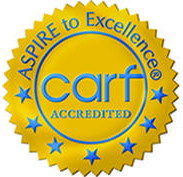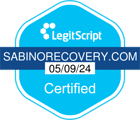Acupuncture for Addiction and Mental Health Treatment in Arizona
Incorporating acupuncture into your evidence-based addiction and mental health recovery process can help achieve balance, alleviate stress, and improve overall mental and physical health. Don’t hesitate – contact Sabino Recovery today to begin your journey towards holistic healing.

What is Acupuncture?
Acupuncture is a traditional Chinese medicine technique that involves the insertion of thin needles into your skin at specific points on your body. This adjunct treatment aims to balance the flow of energy or life force, known as qi or chi, that runs through pathways called meridians. By inserting these needles at strategic locations, acupuncture can help restore the flow of qi, resulting in improved health.
Acupuncture is a process that helps heal the mind and body. The practice originated in China and, through the centuries, grew in popularity. Today, acupuncture helps those with health issues like substance addiction and mental health disorders. Acupuncture began as a philosophy and became a medicinal form of therapy. From Taoist philosophy to everyday uses, acupuncture benefits mental health.
As a form of alternative medicine, acupuncture has been used for centuries to treat addiction and other various ailments. By targeting points connected to addiction-related issues, such as cravings, anxiety, and stress, acupuncture can offer a natural way to manage and alleviate symptoms while supporting recovery.
In recent years, acupuncture has gained recognition in Western medicine and is often incorporated into comprehensive treatment plans alongside conventional therapies. While it might not be a standalone solution to addiction, integrating acupuncture into your recovery process can provide additional support to help you heal and overcome addiction.
Where Philosophy and Healing Meet
The practice of acupuncture blends Taoist philosophy with therapeutic techniques. Taoism comes from the writings of ancient Chinese philosophers who lived in either the 4th or 5th BCE. The foundation of Taoism is a combination of a reflective focus on nature, non-intervention (wei), and the way (dao). Those who practice Taoism look for a fundamental change in attitude when the wei and the dao meet. Through the combination of the two, life will become harmonious, and followers will experience contentment and peace.
A result of Taoism’s belief in nature and non-argumentative style makes it a flexible concept. The flexibility of Taoism allows you to reflect and revise how you view and feel about your mental well-being.
How Acupuncture Works
Acupuncture works by targeting specific body points. Here are some of the target points and their uses:
- Shen Men (HT 7) – “Spirit Gate”: Location: On the inner side of the wrist crease, on the little finger side of the tendon of the muscle flexor carpi ulnaris.
- Uses: This is a commonly used point for emotional and heart-related issues. It’s especially relevant for treating anxiety, insomnia, and heart palpitations. It is often used to alleviate symptoms of withdrawal, especially related to drug or alcohol dependence.
- Zusanli (ST 36) – “Leg Three Miles”: Location: Approximately four finger widths below the kneecap, one finger width outside of the tibia.
- Uses: Known for strengthening overall energy and improving digestion, this point is also used to treat fatigue, depression, and immune-related issues.
- Liver 3 (LV 3) – “Great Surge”: Location: On the foot, between the first and second toes, where the two metatarsal bones meet.
- Uses: Used to help balance emotional energy and alleviate depression, stress, and anger. The liver is associated with the smooth flow of Qi (energy) and blood in the body, and blockages can lead to emotional disturbances. LV 3 is particularly relevant for individuals struggling with substance abuse, as it aids in addiction treatment and reduces cravings.
- Yintang: Location: Midway between the eyebrows.
- Uses: Often referred to as the “third eye” point, Yintang is used to calm the mind, reduce anxiety and stress, and improve focus.
- Ear Points: There are several ear acupuncture points (auricular acupuncture) commonly used to address addiction and withdrawal. The NADA protocol is a specific set of auricular points used internationally to help people with addiction-related issues.
A trained acupuncturist will usually select a combination of points based on an individual’s specific symptoms and needs. If you or someone you know is considering acupuncture for addiction or withdrawal, it’s crucial to consult with a trained and licensed practitioner.
Contact Our Admissions Team Today
Benefits of Acupuncture for Addiction Recovery
Acupuncture offers a holistic approach to addiction recovery, targeting both the physical and psychological aspects. Here are some of the benefits of acupuncture for addiction and mental health:
- Reduced Cravings: Acupuncture can diminish alcohol abuse by regulating the body’s neural pathways.
- Alleviated Withdrawal Symptoms: Common symptoms like anxiety, insomnia, and agitation can be reduced, making the recovery process more manageable.
- Stress Reduction: Acupuncture promotes relaxation, helping to combat the stress or anxiety that might trigger a relapse. Acupuncture can stimulate the release of neurotransmitters that promote relaxation and stress reduction, helping to regulate the body’s stress response.
- Emotional Balance: It aids in regulating mood swings and depression, often linked with addiction.
- Managing Withdrawal: Certain acupuncture points can help alleviate alcohol or drug withdrawal symptoms
- Enhanced Well-being: Overall, patients often report improved sleep and a heightened sense of well-being, providing a positive foundation for sustained recovery.
- Anxiety Relief: Several studies suggest that acupuncture can be beneficial in reducing symptoms of anxiety disorders by acting on areas of the brain responsible for reducing sensitivity to pain and stress.
- Improved Sleep: Acupuncture can address insomnia and other sleep disorders, potentially by influencing the production of melatonin, a hormone that regulates sleep.
- Balanced Energy: Traditional Chinese Medicine views mental illness as an imbalance of the body’s Qi (energy). Acupuncture seeks to restore this balance, promoting overall emotional well-being.
- Holistic Approach: Acupuncture addresses the mind-body connection, providing a holistic approach to mental health that complements conventional treatments.
Incorporating acupuncture into a comprehensive drug addiction treatment plan can offer a supportive and beneficial route to overcoming addiction and mental health challenges.

Testimonials
![]()
![]()
![]()
![]()
![]()
Regina
I am so happy that I chose Sabino to begin my recovery. I have suffered for years from depression, anxiety, panic disorder, and PTSD. The programs that are offered here at Sabino have been truly phenomenal in helping me recover. I also appreciated the professional staff that are here on duty 24/7, which helps create a safe environment. Sabino Recovery uses effective “one on one” methods that meet each person’s individual needs because they evaluate and have a better understanding of your personal traumatic experiences. Thanks Sabino, I am truly grateful to you and the Sabino family.
![]()
![]()
![]()
![]()
![]()
J.A.
A beautiful facility! Staff sets the tone and kindness that residents easily follow. Thank you, Sabino Recovery!
![]()
![]()
![]()
![]()
![]()
Pamela
The program at Sabino Recovery works! I emerged from an accumulation of unrecognized emotions, issues of trust, and unresolved grief and loss. 35-days of effective integration of customized quality therapy reconnected my mind, body, spirit, and I am worth it! I had masked emotions and hurtful events for decades with alcohol. At Sabino Recovery I safely focused deep within to unleash harmful secrets and self-degradation. Tools of recovery were practiced, not just presented. Integrative therapies were tailored to my circumstances, thus were effective. This residential program is like no other. For me, Sabino Recovery delivered what was professed. I am forever grateful for this gift of healing.
![]()
![]()
![]()
![]()
![]()
Mike
Life changing experience. Wonderful staff. Wonderful program. Thanks for everything!
![]()
![]()
![]()
![]()
![]()
Darcy
It was great to begin my recovery in a group environment with so many knowledgeable nurses, therapists, BHT’s, and others around for support. The equine therapy, challenge course, family week, and daily therapies all work together seamlessly, allowing me to leave Sabino as a healthier and stronger person!
Common Conditions Acupuncture Therapy is Used to Treat
Acupuncture is used to treat a wide range of conditions. Here’s a list of some common conditions that acupuncture can address:
- Pain Management: Including chronic pain, arthritis, migraines, headaches, and back, neck, or joint pain.
- Digestive Issues: Such as irritable bowel syndrome (IBS), gastritis, acid reflux, and constipation.
- Mental Health Conditions: Including anxiety, depression, insomnia, and stress.
- Respiratory Conditions: Asthma, allergies, sinusitis, and bronchitis.
- Reproductive Issues: Infertility, menstrual cramps, polycystic ovary syndrome (PCOS), and menopausal symptoms.
- Neurological Disorders: Post-stroke rehabilitation, Bell’s palsy, and neuropathies.
- Skin Conditions: Eczema, acne, and psoriasis.
- Addictions: Smoking cessation, alcohol addiction, and heroin addiction.
- Weight Management: Aiding in weight loss and improving metabolism.
- Immune System Boosting: Enhancing the body’s resistance to diseases and illnesses.
- Fatigue: Including chronic fatigue syndrome.
Many addiction and mental health treatment centers now incorporate alternative therapies like acupuncture as a complementary therapy, offering relief from withdrawal symptoms, assisting in the rapid cleansing of tocins in your body, and relieving mental health symptoms. Incorporating acupuncture into your mental health or addiction treatment plan may increase the likelihood of successful recovery and improve overall health.

Acupuncture and Behavioral Health Treatment at Sabino Recovery
Once a week, you have the opportunity to participate in an acupuncture session to help you heal. Acupuncture works well alongside our other evidence-based therapy options designed for treating addiction. Each resident will participate in 50 one-on-one individual sessions in 35 days, as well as group therapy, with small groups of no more than eight people.
A significant part of our addiction treatment program is our robust family program. Families are encouraged to join in-person therapy sessions on campus, fostering communication and healing among loved ones. Our family therapists are dedicated to supporting you and your family throughout the recovery process.
Lastly, Sabino Recovery alumni can access our lifelong alumni program free of charge. This program includes personalized follow-up, structured weekly group Zoom calls, and alumni reunions, emphasizing our commitment to long-lasting recovery and support.
Nationally Recognized & Accredited




Recover from Behavioral Health Challenges with Our Acupuncture Treatment
At Sabino Recovery, we offer acupuncture treatments to support your journey to overcoming addiction and mental health disorders. We understand that each individual’s recovery process is unique. Our skilled practitioners tailor acupuncture sessions to your specific needs, focusing on rebalancing the body’s energy and relieving symptoms associated with substance abuse.
Take a step towards a healthier future by incorporating acupuncture into your recovery treatment. Contact Sabino Recovery today!





